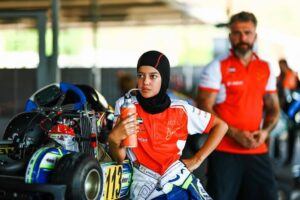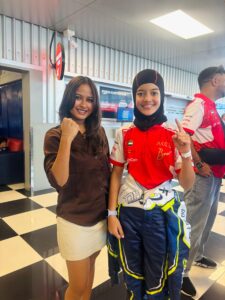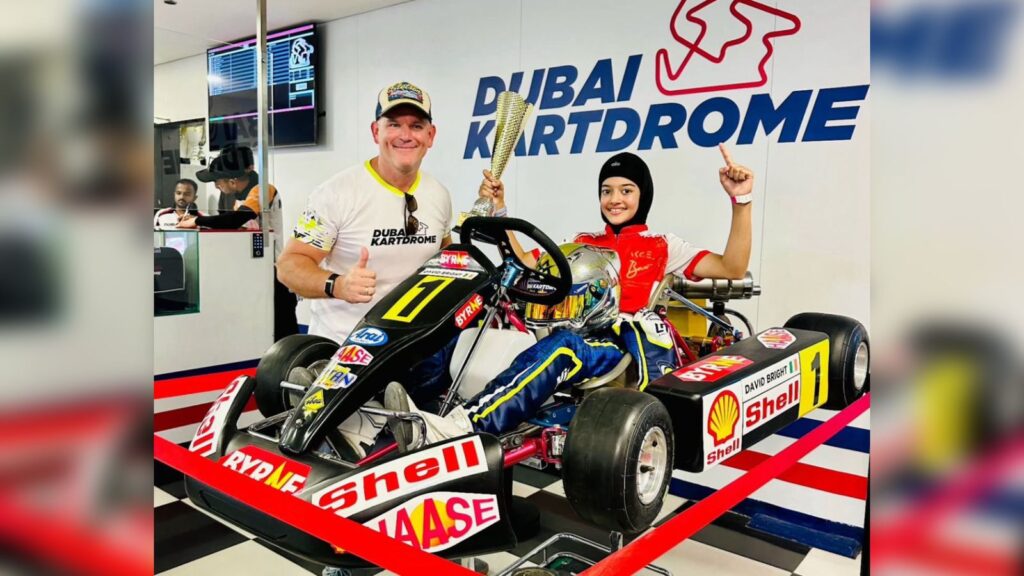
Gargi Raut in Dubai
Indian motorsport has a bright future in the form of Atiqa Mir, the 10-year-old sensation who has been capturing all headlines. She is rewriting history and has become the first Indian to receive direct support from Formula 1’s F1 Academy. In an exclusive conversation with RevSportz, Atiqa, alongside her father Asif Mir – a former Formula Asia driver and India’s first national karting champion – spoke about the young driver’s journey from mall karting to global recognition.
Atiqa, where did it all begin? When was that moment behind the wheel when you thought: I love doing this?
Atiqa: I think my father was a former Formula Asia driver in the early 2000s, and he was also India’s first national karting champion. I saw his races, and he was doing local championships in the UAE. So, I got inspired. I think I just started like that, and I got inspired by my dad.
Asif, how important was it for her to start karting? Was there ever a goal you had in mind?
Asif: No, never. I had no idea that she would take to racing. I never groomed her for it. It just happened by chance. There was something brewing inside of her all these years, and I never saw it. One fine day, it all just came together.
Was there a particular moment when you realised she had serious talent?
Asif: Yes, there was this one moment on the track. She wanted to do a championship with no experience. I gave her a target lap on a track she had never driven before, very difficult to do. She was overweight, unfit, too heavy for the kart. But she was determined, and she did it.

How old was she then?
Asif: Six. She was the same weight at six that she is now, and now she’s almost turning eleven. You can imagine – she didn’t look like a racer, but she was determined and she made herself into one.
Atiqa, what are your earliest memories of racing?
Atiqa: The first time I stepped in a kart was when I was six, on a track in the UAE. Before that, I did rental karting in the Dubai Indoor Kart Drome, which is right next to here. I remember the first time I drove a mini kart; it was here. I’ve driven lots of tracks and have lots of memories even from my first time.
You’ve grown up between Srinagar, Delhi, and Dubai. Was that journey difficult?
Asif: No, we were quite blessed. We had some business outside Srinagar and in Mumbai, and through Mumbai, we opened business in Dubai. We moved to Dubai in 2017 when she was only three years old. The karting scene here is so professional and so good, she was in the right place at the right time.
What does a normal training day look like for you?
Atiqa: If it’s during school days, I wake up at 4:30 in the morning to do some exercises. I run around my colony every day. Then I go to school from 7 to 3. After school, I rest for an hour, eat, and then from 4 to around 6:30, I go to the gym and work out. In the morning, it’s more running, in the evening, it’s more working out. Earlier, when I started, when I was six or seven, I was overweight, so I had to focus loads on my diet. I lost around 10 kgs in five months.
Asif: At six years old, for her to understand and accept that she needed to do this, that’s huge maturity. That’s why we are here today, competing against the best. She just won her race here, qualified on pole position, and even in Europe she’s getting top 10s against drivers way more experienced than her.

Karting is still a very male-dominated sport. Have you faced bias on the track?
Asif: Yes, we always told her, “It’s just a kart, just a number.” But when she started, she came to us and said, “Why do they keep hitting me? Why me? They don’t hit anyone else.” It became pretty obvious there was gender bias. We couldn’t lie to her. We told her, “You’re a girl. They don’t like getting beaten by girls.” She’s accepted it and now gives it back to them.
Atiqa: I just try and focus on the next one and learn from what I did. Coming back from Europe, I learned loads. That’s the main reason I won here. Experience really matters.
Tell me about your idols and this incredible F1 Academy support you’ve received.
Atiqa: In Formula 1, my idol is Max Verstappen. I look forward to him winning his fifth world title, but I don’t think it’s going to happen this season. I think Oscar Piastri will because he’s better under pressure, and Lando Norris sometimes makes mistakes.
In the F1 Academy, my idols are Maya Weug and Doriane Pin, who is currently leading the series. Getting selected by the Discovery program is also a big thing that can help me climb up to Formula 1. Getting their support is huge. I just have to keep pushing, keep learning, and keep trying.
Asif, how did the F1 Academy connection happen?
Asif: They basically got in touch with us. They saw her performances, tracked her progress, and were happy to select her. We were very excited. We got an email from them, printed it out, rushed to her room while she was sleeping, woke her up, and showed her. It was a great moment.
What are the goals from here, short term and long term?
Asif: The natural progression in motorsport is karting, then single-seaters. Five years from now, she’ll be 16, so we should be in single-seaters by then, maybe Formula 4 or Formula Regional. Of course, she needs to keep performing and everything has to work out.
Atiqa: My goal is to keep progressing in karting because karting is all about the basics, not just results. It’s a stepping stone to single-seaters. Even if you don’t get the results in karting but you win in Formula 1, whether it’s a world championship, a pole position, or just a race, it all helps you move forward. Maybe at 14 or 15, I’ll start driving in Formula 4, then Formula 3, Formula 2, and finally Formula 1.
Motorsport is an expensive sport. What’s your message to parents of aspiring racers?
Asif: Racing depends completely on finances. You need a budget, the right partners, and sponsors. We’re quite blessed with Axel GP and the F1 Academy. For people starting out, the best thing is to go to local rental karting, that’s inexpensive. If there’s serious talent, put a proposal together, get budgets, get sponsors. It’s a sponsor-dependent sport and not always fair, but things are changing in India. Hopefully Atiqa will inspire the next generation, especially girls.
Atiqa, what’s your message to girls who want to follow in your footsteps?
Atiqa: Believe in yourself, find a passion, dream it, follow it, work hard on it, and never give up. Don’t let anyone tell you that you can’t do it. Always remember that failure is temporary, and success is permanent. You will always find success at one point in your life. Maybe you’ll fail and then succeed, or succeed and then fail, but it will work out if you keep pushing.





